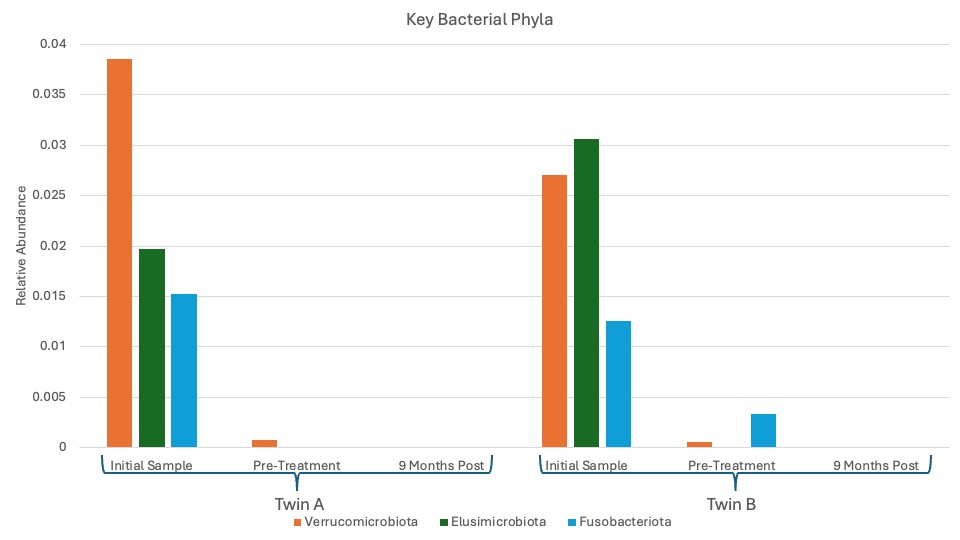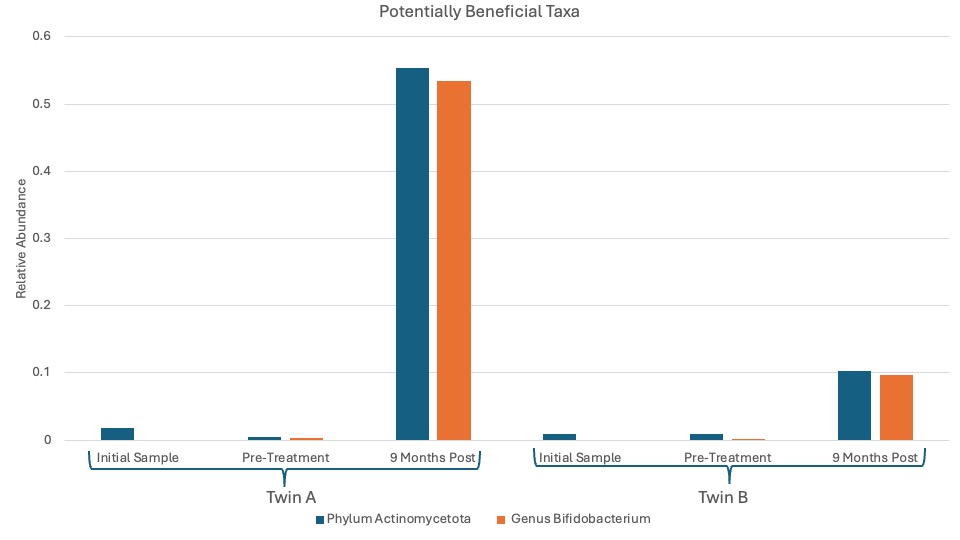Tuesday Poster Session
Category: Infections and Microbiome
P5636 - A Potential Microbiome Signature Showcasing Improvement of Autism in 2 Identical Twins
Tuesday, October 28, 2025
10:30 AM - 4:00 PM PDT
Location: Exhibit Hall
- SH
Sabine Hazan, MD
ProgenaBiome
Ventura, CA
Presenting Author(s)
Sabine Hazan, MD
ProgenaBiome, Ventura, CA
Introduction: This study explores the remarkable speech recovery in two identical twins, Twin A and Twin B, diagnosed with severe autism spectrum disorder and non-verbal status, over a 9-month microbiome-targeted intervention, focusing on the modulation of gut bacterial taxa. At baseline, both twins exhibited no verbal communication and significant microbial dysbiosis, with low levels of beneficial taxa and elevated levels of potentially harmful phyla, known to influence the gut-brain axis. The intervention aimed to increase beneficial microbes while reducing harmful ones, hypothesizing that these microbial shifts could improve neurological outcomes, including speech.
Case Description/
Methods: The first graph, "Potentially Beneficial Taxa," shows the relative abundance of *Phylum Actinomycetota* (dark bars) and *Genus Bifidobacterium* (light blue bars). At baseline, both twins had near-zero levels (< 0.05). By 1 month post-intervention, a slight increase was observed. At 9 months, Twin A showed a significant rise (*Phylum Actinomycetota* ~0.55, *Genus Bifidobacterium* ~0.50), while Twin B had a more modest increase (~0.10). The second graph, "Key Bacterial Phyla," displays *Verrucomicrobiota* (purple), *Elusimicrobiota* (orange), and *Fusobacteriota* (green). At baseline, Twin A had high levels (*Verrucomicrobiota* ~0.035, *Elusimicrobiota* ~0.02, *Fusobacteriota* ~0.015), and Twin B showed slightly lower but elevated levels (*Verrucomicrobiota* ~0.025, *Elusimicrobiota* ~0.015, *Fusobacteriota* ~0.01). By 9 months, Twin A’s harmful phyla were near zero, while Twin B maintained low levels (*Fusobacteriota* ~0.005, others negligible).
Discussion: Concurrently, both twins regained speech. By 9 months, Twin A, with the most significant microbial shifts, achieved advanced verbal communication, forming full sentences, engaging in conversations and reading. Twin B, with less pronounced changes, developed full functional speech but less reading capabilities. Both ATEC and CARS scores improved. These findings suggest a correlation between increased beneficial taxa, reduced harmful phyla, and speech recovery in severe ASD. The intervention likely alleviated neuroinflammatory stressors via the gut-brain axis, facilitating neurological improvements. This case study highlights the potential of microbiome-based therapies for ASD and calls for further research into microbial influences on neurodevelopmental outcomes.

Figure: Potentially Beneficial Taxa

Figure: Key Bacterial Phyla
Disclosures:
Sabine Hazan: Progenabiome – Owner/Ownership Interest.
Sabine Hazan, MD. P5636 - A Potential Microbiome Signature Showcasing Improvement of Autism in 2 Identical Twins, ACG 2025 Annual Scientific Meeting Abstracts. Phoenix, AZ: American College of Gastroenterology.
ProgenaBiome, Ventura, CA
Introduction: This study explores the remarkable speech recovery in two identical twins, Twin A and Twin B, diagnosed with severe autism spectrum disorder and non-verbal status, over a 9-month microbiome-targeted intervention, focusing on the modulation of gut bacterial taxa. At baseline, both twins exhibited no verbal communication and significant microbial dysbiosis, with low levels of beneficial taxa and elevated levels of potentially harmful phyla, known to influence the gut-brain axis. The intervention aimed to increase beneficial microbes while reducing harmful ones, hypothesizing that these microbial shifts could improve neurological outcomes, including speech.
Case Description/
Methods: The first graph, "Potentially Beneficial Taxa," shows the relative abundance of *Phylum Actinomycetota* (dark bars) and *Genus Bifidobacterium* (light blue bars). At baseline, both twins had near-zero levels (< 0.05). By 1 month post-intervention, a slight increase was observed. At 9 months, Twin A showed a significant rise (*Phylum Actinomycetota* ~0.55, *Genus Bifidobacterium* ~0.50), while Twin B had a more modest increase (~0.10). The second graph, "Key Bacterial Phyla," displays *Verrucomicrobiota* (purple), *Elusimicrobiota* (orange), and *Fusobacteriota* (green). At baseline, Twin A had high levels (*Verrucomicrobiota* ~0.035, *Elusimicrobiota* ~0.02, *Fusobacteriota* ~0.015), and Twin B showed slightly lower but elevated levels (*Verrucomicrobiota* ~0.025, *Elusimicrobiota* ~0.015, *Fusobacteriota* ~0.01). By 9 months, Twin A’s harmful phyla were near zero, while Twin B maintained low levels (*Fusobacteriota* ~0.005, others negligible).
Discussion: Concurrently, both twins regained speech. By 9 months, Twin A, with the most significant microbial shifts, achieved advanced verbal communication, forming full sentences, engaging in conversations and reading. Twin B, with less pronounced changes, developed full functional speech but less reading capabilities. Both ATEC and CARS scores improved. These findings suggest a correlation between increased beneficial taxa, reduced harmful phyla, and speech recovery in severe ASD. The intervention likely alleviated neuroinflammatory stressors via the gut-brain axis, facilitating neurological improvements. This case study highlights the potential of microbiome-based therapies for ASD and calls for further research into microbial influences on neurodevelopmental outcomes.

Figure: Potentially Beneficial Taxa

Figure: Key Bacterial Phyla
Disclosures:
Sabine Hazan: Progenabiome – Owner/Ownership Interest.
Sabine Hazan, MD. P5636 - A Potential Microbiome Signature Showcasing Improvement of Autism in 2 Identical Twins, ACG 2025 Annual Scientific Meeting Abstracts. Phoenix, AZ: American College of Gastroenterology.

